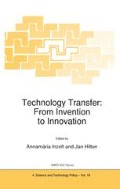Abstract
Man’s march from the cave to the information society has depended on the accumulation of knowledge and its transmission between generations and communities. A distinction must be made between knowledge accumulation and utilisation. Knowledge accumulation and its diffusion in time and space is imminent in humankind. It is the very essence of progress, improving living conditions and quality of life. The role of knowledge has changed significantly in this century. This paper concentrates on a narrow issue, namely, which models of innovation help to exploit science and technology for human well-being, improved competitiveness, the wealth of nations, protection of environment, etc. It touches on the transmission of knowledge and concentrates on flows of knowledge, and on the processes and players of transfer. It does not investigate the stock or the production of knowledge, inspirations of science, etc. The first section summarises the shift in the economic role of knowledge, the second investigates the different models of innovation and then goes into details of the tools and capabilities of transfers when feedback loops are important. The third section discusses the organisational issue and the fourth some questions beyond national boundaries. The fifth touches on the measurement of the flow of knowledge and the transfer of technology. The sixth makes some concluding remarks.
“For those cities that were great in earlier times must have now become small, and those that were great in my time were small in the time before... Man’s good fortune never abides in the same place.”
Herodotus (cited by Michael Ondaatje 1993)
Access this chapter
Tax calculation will be finalised at checkout
Purchases are for personal use only
Preview
Unable to display preview. Download preview PDF.
References
Andreasen L. E, Coriat, B, den Hertog, F., and Kaplinsky, R. (eds.) 1995 Europe’s Next Step. Organisational Innovation, Competition and Employment, Frank Cass Co. Ltd, Great Britain
Aoki, M. 1988 Information, Incentives and Bargaining Structure in the Japanese Economy, Cambridge University Press, Cambridge
Balâzs, K. and Török, A. 1996 “Tudâs-és technolôgiatranszfer-szerveztek és mechanizmusok a fejlett orszâgokban és az âtalakulô Magyarorszâgon. Összefoglalô tanulmâny”, (Science and technology transfer organisations in advanced economies and in Hungary. Summary report) OMFB, Budapest
Berkhout, A. J. 1997 “The Knowledge System for Product(ion) Innovation.” Paper presented to an OECD workshop, September 1997, Budapest
Chandler, A. 1992 “Corporate Strategy, Structure and Control Methods in the United States in the 20th Century”, Industrial and Corporate Change, No 1. pp. 263–284.
David, P. and Foray, D. 1995 “Accessing and Expanding the Science and Technology Base” STI Review, No 16, OECD, Paris
Davies, S. 1979 The Diffusion of Process Innovations, Cambridge University Press
EIMS (European Innovation Monitoring System) 1994 Public Policies to Support Tacit Knowledge Transfer, Proceedings of SPRINT/EIMS Policy Workshop, May, 1993
Hayashi, T. 1997 “RandD Capabilities of Eastern Asian Countries - centring on Asian NIEs” in: Technology Transfer: from Invention to Innovation (eds.: Inzelt és Hilton ), Kluwer, 1998 forthcoming
Inzelt, A. 1988 Rendellenességek az ipar szervezetében (Abnormalities in the Organisation of Industry) Közgazdasâgi és Jogi Könyvkiadô, Budapest.
Inzelt, A. 1994 “Restructuring of the Hungarian Manufacturing Industry” Technology in Society, 16, 1, 1994, pp. 35–63.
Inzelt, A. 1996 OECD “The Main Results of Hungarian Pilot Innovation Survey, (Application of First OECD/EC Questionnaire)” Conference proceeding “Conference on Implementation of OECD Methodologies for RandD/SandT Statistics in Central and Eastern European Economies”, OECD Paris
Inzelt, A. 1997 “To foster a Society in a Fellow Traveller Country” in: The 21st Century Opportunities and the Challenges for the Asian Economies: Science, Technology and Innovation Policy (eds. Heitor M, Gann D, Gibson D, Martins, R. Shariq S, Xuelim C ) forthcoming
Kline, S. J. and N. Rosenberg 1986 „an Overview of Innovation” in R. Landau and N. Rosenberg (eds.) The Positive Sum Strategy: Harnessing Technology for Economic Growth, National Academy Press, Washington D.C.
Morita, Akio 1989 Made in Japan, Akio Morita and Sony (with Edwin M. Reingold and Mitsuko Shimomura), Hungarian translation, Arkâdia, Budapest
Narin, F. Hamilton K. S. and D. Olivastro 1997 “The Increasing Linkage between US Technology and Public Science ” Research Policy, October 1997, pp 317–330.
Neumann, John von, 1958 The computer and the brain, New Haven, Yale University Press
OECD 1992 Technology Balance of Payments, Paris
OECD 1996a Oslo Manual, OECD, Paris
OECD 1996b The Knowledge-based Economy, OECD Paris
OECD 1996c Canberra Manual, OECD, Paris
Ondaatje, Michael 1993 The English Patient, Vintage International, New York, 1993, cited page 142
Patkôs, A. 1997 “Excellence and Social Relevance in Hungarian Higher Education” in: Technology Transfer: from Invention to Innovation eds.: Inzelt, A. and J. Hilton, Kluwer, 1998, forthcoming
Pavitt, Keith 1996 “National Policies for Technical Change: Where are the Increasing Returns to Economic Research?” ( Paper prepared for publication in the Proceedings of the National Academy of Sciences, Washington, D.C. )
Patel, P. and K. Pavitt 1994 “Uneven (and Divergent) Technological Accumulation among Advanced Countries” Industrial and Corporate Change, No. 3. pp 759–787.
Rosenberg, Nathan 1983 Inside the Black Box: Technology and economics, Cambridge University Press
Rothwell, Roy 1994 “Industrial Innovation: Success, Strategy, Trends” in Dodgson, Mark and Rothwell Roy, The Handbook of Industrial Innovation, Edward Elgar, Cheltenham, UK pp 33–53
Utterback, James M. 1994 Mastering the Dynamics of Innovation, Harvard Business School Press, Boston, Massachusetts
Verspagen, Bart 1997 “A Global Perspective on Technology and Economic Performance” paper presented on NATO ARW Quantitive Studies for SandT Policy in Economies in Transition, 23–25 October 1997, Moscow
Author information
Authors and Affiliations
Editor information
Editors and Affiliations
Rights and permissions
Copyright information
© 1999 Springer Science+Business Media Dordrecht
About this chapter
Cite this chapter
Inzelt, A. (1999). Are Transition Countries ‘Insiders’ or ‘Outsiders’ of the Knowledge-Based Economies?. In: Inzelt, A., Hilton, J. (eds) Technology Transfer: From Invention to Innovation. NATO ASI Series, vol 19. Springer, Dordrecht. https://doi.org/10.1007/978-94-015-9145-4_1
Download citation
DOI: https://doi.org/10.1007/978-94-015-9145-4_1
Publisher Name: Springer, Dordrecht
Print ISBN: 978-90-481-5182-0
Online ISBN: 978-94-015-9145-4
eBook Packages: Springer Book Archive

